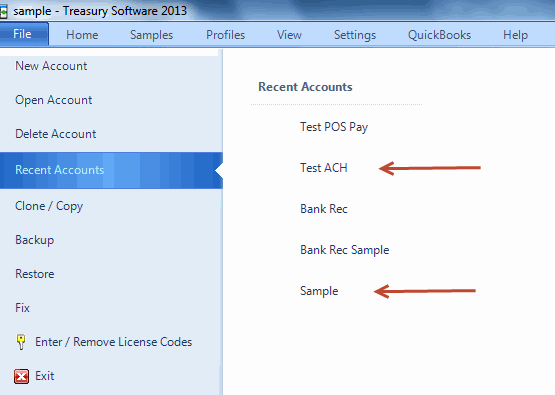Multiple Origination Accounts
Multiple Origination Accounts and Third Party NACHA (processor) rules
What is an Origination Account?
An Origination Account is a bank account that you own (or control), that you send payments from, or collect funds into.
For example, a company's payroll account that is set up for ACH service, would be an origination account.
How do we work with more than one account?
We are a large company and have two origination accounts - one for payroll and one for vendor payments (A/P).
How do we work with multiple accounts?
Approaches -'Traditional' vs. 'Consolidated'
When working with multiple origination accounts, a company can choose whether to create and send an ACH file from each account - or to consolidate into a single ACH file.
I. Traditional approach
You would create multiple accounts (databases) within ACH Universal.
Each account will create an ACH file.

The traditional approach is best used when there is a need to segregate duties and access to data. Often - payroll will be a separate function, and the the 'net pay' needs to be kept private.
II. Consolidated (a.k.a. Multiple Origination Accounts - Third Party Fiduciary NACHA Rules)
With ACH Universal Processor edition, we offer our customers the ability to work with a single ACH file.
Example:
A benefit plan administrator (processor) needs to make payments weekly on behalf of their fifty clients.
Use the consolidated approach. What would have been a separate file, is now a 'batch' within the ACH file.
The Batch Header provides the bank with the 'Origination' account.

Advantages
By using a single consolidated file, the processor can minimize the tedious and error-prone process of transmitting (and confirming) 50 individual files. Also, as the processor is charged $15 per ACH file by their bank, the processor saves $735 each week (49 files not transmitted x $15).
NACHA Compliance
By placing the originating Company Name in the batch header ('5' record, positions 5 - 20), you will stay in compliance with NACHA's Third Party Rules and Regulations.
Not just for Processors
Whether you are a
• Law firm - or other fiduciary and cannot commingle escrow accounts
• Company administrator - divisional/regional/site, and consolidation or sweep accounts
• Company administrator - and need segregation of duties - disbursement, payroll and depository accounts
• Service provider - an ACH processor collecting funds on behalf of others
• Outside legal ownership - a payroll company drafting on other's accounts
